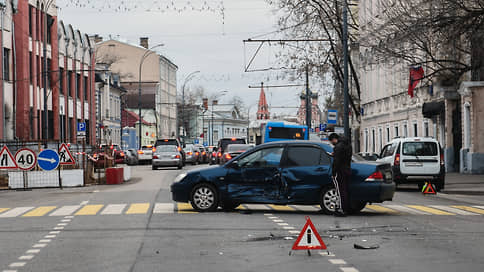The Constitutional Court dealt with the collision – Kommersant
[ad_1]

From now on, motorists cannot be punished twice for hitting a pedestrian, the Constitutional Court ruled. It turned out that the current version of the Code of Administrative Offenses contradicts the Basic Law, allowing to bring the offender under two articles at once – 12.18 (failure to provide an advantage to a pedestrian) and 12.24 (damage to health during an accident) – for the same, in fact, violation. The ban imposed by the court will be temporary until the State Duma finds a way to eliminate the conflict. Legislators were obliged to develop and adopt appropriate amendments to the Code of Administrative Offenses.
The decision of the Constitutional Court published and entered into force is based on the case of Robert Chepurny; driving his car, he ran into a boy in Volsk (Saratov region). First, the traffic police fined the driver under Art. 12.18 of the Code of Administrative Offenses (failure to provide an advantage in traffic to pedestrians) for 1.5 thousand rubles. Then the district court deprived Mr. Chepurny of his rights, punishing him under Art. 12.24 (violation that caused minor or moderate bodily harm in an accident), because the victim had a broken arm. Robert Chepurnoy appealed the decision in several courts, referring to the prohibition to punish twice for the same violation – this is provided for by Art. 4.1 of the Code of Administrative Offenses and Art. 50 of the Constitution. The courts each time came to the conclusion that there were two different elements of the offense with a different “legal nature”. Then Mr. Chepurnoy turned to the Constitutional Court.
The court, having examined the materials of the case, came to the conclusion that the articles of the current version of the Code of Administrative Offenses still contradict the Constitution. It is curious that in the ruling issued, the judges refer to the decision of the plenum of the Supreme Court of 2019, which, in fact, allowed the application of Articles 12.24 and 12.18 simultaneously (although this was not practiced before). However, this position is not supported by the Constitutional Court. “This, on the one hand, is consistent with considerations of justice, but, on the other hand, intrudes into the scope of the prohibition to prosecute twice for the same act,” the Constitutional Court’s ruling says. The court ordered the legislator to develop and adopt amendments to the Code of Administrative Offenses so that it would be possible to punish citizens under Art. 12.18 and 12.24, but in such a way that it does not contradict the Constitution.
Until the amendments are adopted, there is a temporary prohibition to apply two articles simultaneously. It works as follows. Suppose a citizen crossed the road on a zebra and was hit by a car, no injuries were recorded, the traffic police issued a material under Art. 12.18. Later, the victim goes to the clinic or hospital; there it turns out that he has a fracture (or other damage to health of mild or moderate severity). The medical institution will report the injury to the police, which, in turn, initiates a case under Art. 12.24 and sends the materials to the court.
But this rarely happens, Vladimir Sokolov, head of the Union of Pedestrians, explained to Kommersant: usually the victim himself has to contact the police with a certificate from the clinic. The court, follows from the decision of the Constitutional Court, before punishing the driver under Art. 12.24, should now note the previously issued fine under Art. 12.18.
According to the Scientific Center for Road Safety of the Ministry of Internal Affairs, in 2022 under Art. On 12.18, 1.19 million cases were initiated for refusing to give way to a pedestrian (+4% by 2021). According to Art. 12.24 of the Code of Administrative Offenses, 27.1 thousand people were punished (+1.4% by 2021), of which 20.3 thousand were fined, 6.3 thousand were deprived of their rights, follows from judicial statistics.
“The decision is absolutely correct,” believes Serhiy Radko, a lawyer for the Freedom of Choice movement. Art. 12.18. And then a case is initiated under Art. 12.24. At the same time, as a rule, in both cases, a violation of the same traffic rules is charged.
It will be difficult for the courts to execute the decision of the Constitutional Court, says Katerina Solovieva, a lawyer and traffic safety expert. By the time the court received materials under Art. 12.24 of the traffic police decision under Art. 12.18, most likely, will already come into force (a ten-day appeal period will pass). The judge, recalls Ms. Solovieva, has the right to cancel only those fines that have entered into force that were originally issued by the court. To cancel the traffic police fine, the inspector himself needs to restore the period for appealing it. Most likely, no one will do this, therefore, according to Katerina Solovieva, before the adoption of amendments to the Code of Administrative Offenses, the courts will simply stop proceedings under Art. 12.24 of the Code of Administrative Offenses, and drivers who knock down or hit pedestrians at crossings will get off with a previously issued fine.
[ad_2]
Source link








